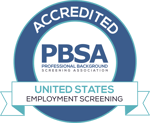
An employer’s obligations under the FCRA carry many responsibilities from which a business may suffer financial and reputational loss if ignored.
Before we get started, make a note of this:
Nearly half of the U.S. has some sort of law in addition to the FCRA (whether statewide or local), most often regarding criminal records, credit reports, consent forms and the adverse action process. It’s likely you have additional obligations beyond the discussion found in this article.
Below you’ll find an overview of some of the most important responsibilities every employer should know before running a background check. Keep in mind, this is not all-inclusive so make sure you seek qualified advice to ensure your compliance.
Get consent 1st
Under the FCRA, employers must get permission to run a background check from the subject of the report before initiating the request. This is accomplished through obtaining a signed Consent Form, also referred to as an Authorization and Disclosure Form.
The FCRA requires the Consent Form be a stand alone document that contains specific language. It also prohibits erroneous information, which the courts have concluded applies to state/local required disclosures. Eliminating state-specific disclosures makes the Consent Form FCRA compliant, but also renders it non-compliant according to state requirements. As such, employers must be aware of and communicate additional disclosures as required.
Taking adverse action
If you make a decision that negatively impacts the subject of the background report, based all or in part on the results of the report, you must follow the adverse action process.
According to the FCRA, this includes:
- Pre-Adverse Action
- Wait a reasonable amount of time
- Post-Adverse Action
For more information about Adverse Action, read this article. Similar to consent forms, many states and local laws hold additional requirements.
Provide a copy of the report
The FCRA ensures the right of a consumer to see a copy of their report when requested; there is no lawful cause to refuse the request.
The FCRA uses this provision to encourage transparency. In doing so, it allows the consumer to identify and dispute inaccuracies – regardless of whether these influenced your decision.
Allow the consumer to dispute
Any information that is identified as inaccurate can be disputed with the agency running the background check. Similar to providing a copy of the report, there is no lawful cause to deny the subject of the report their right to dispute.
When a dispute is submitted, Choice Screening will verify the information being disputed with the original source. Upon conclusion, you and the applicant/employee will be notified that either the original report was confirmed or that it was updated according to our researcher’s findings.
This Dispute Process Infographic clearly outlines disputes for you and your applicant/employee.
Security & Privacy
The FCRA obliges users and providers of background reports to ensure adequate security so that personal information about the consumer cannot fall into the wrong hands.
Some of these responsibilities include:
- Ensure only those authorized to see a consumer report gain access.
- Store reports in a secure location whether digital, hard copy or otherwise.
- Dispose of consumer reports in a manner that cannot be read or reconstructed – whether digital or hard copy.
Tactics employed by business include avoiding shared login credentials and using strong passphrases (rather than passwords). Ensuring hard copies are locked and are never left sitting out protects privacy. Using a shredder service or high security shredder will securely dispose of old documents as well as clearing hard drives before getting rid of an old computer.
Mastering an employer’s obligations under the FCRA when background screening
Penalties for FCRA non-compliance can easily exceed tens of thousands and willful non-compliance leaves employers vulnerable to punitive damages. This only considers enforcement by the FTC and CFPB. Other agencies including the EEOC and local government can wreak havoc.
Although the recent Supreme Court decision in Spokeo, Inc. v. Robins established the need for “concrete” evidence of harm when suing in federal court, state courts are not bound to the same standard. Furthermore, how one must go about proving concrete evidence of “intangible” injury was not clearly defined.
In order to navigate these challenges, many employers rely on free advice from the Small Business Association and Federal Trade Commission, professional recommendations from Choice Screening, and pay for legal advice whenever appropriate. This complete approach lets you fully assess vulnerabilities and adequate adherence to the FCRA.
Where the FCRA is concerned, it’s a best practice to utilize all the tools at your disposal – especially Choice Screening’s expert staff!


